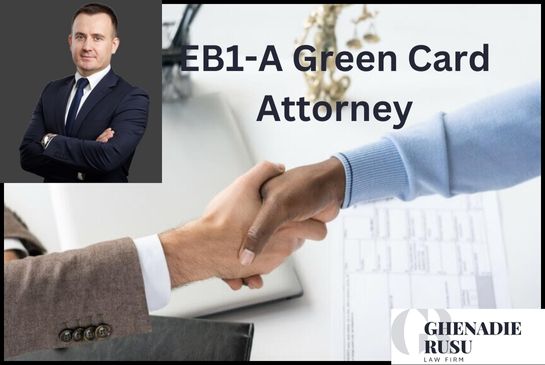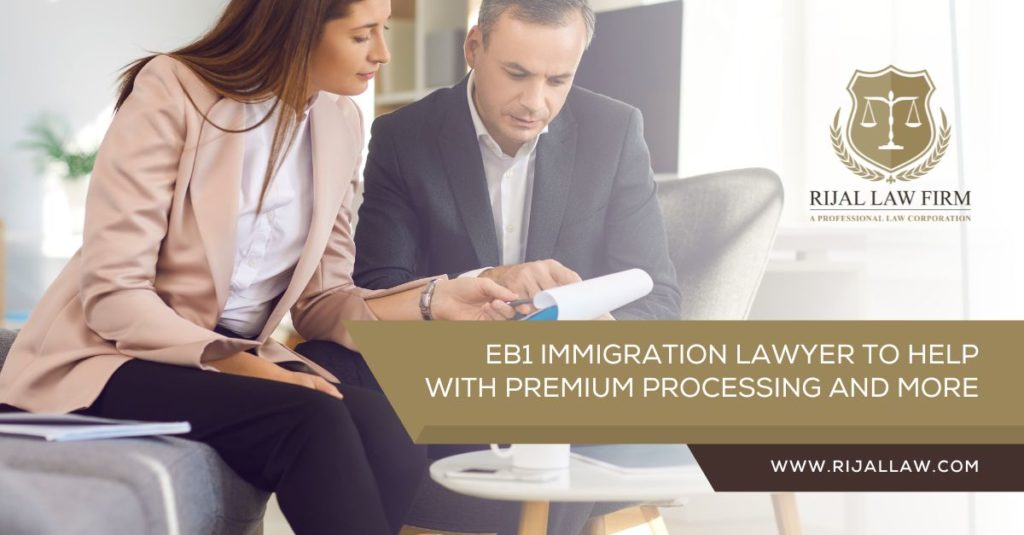EB1 Immigration Lawyer
by Admin
Posted on 13-01-2025 06:22 AM

Understanding the EB-1 Visa
The EB-1 visa is designed to attract top-tier talent to the United States. It is divided into three subcategories:
1. EB-1A: Individuals with Extraordinary Ability
This category is for individuals who have demonstrated extraordinary ability in the sciences, arts, education, business, or athletics. To qualify, you must provide substantial evidence of your achievements and recognition in your field.
2. EB-1B: Outstanding Professors and Researchers
This category is for professors and researchers who have achieved international recognition for their outstanding achievements in a particular academic field. You must have at least three years of relevant experience and be entering a tenure-track teaching or comparable research position.
3. EB-1C: Multinational Executives and Managers
This category is for executives and managers who have been employed by a multinational corporation and are being transferred to a managerial or executive position in a U.S. affiliate or subsidiary. You must have been employed by the foreign company for at least three of the last five years.
EB1 Immigration Lawyer to Help with Premium Processing and More
An experienced EB1 green card lawyer can provide invaluable assistance with premium processing and other complex aspects of the immigration process. Whether you are navigating the EB1 visa application or dealing with other immigration challenges, having a knowledgeable lawyer by your side can make a significant difference.
The Role of an EB-1 Immigration Lawyer
An EB-1 immigration lawyer plays a crucial role in the visa application process. Here are some of the key responsibilities and benefits of working with a legal professional:
1. Expertise in Immigration Law
EB-1 immigration lawyers have specialized knowledge of U.S. immigration law and the specific requirements for each EB-1 subcategory. They can provide valuable insights and guidance to ensure that your application is complete and compliant with all regulations.
2. Document Preparation and Review
One of the most critical aspects of the EB-1 application process is the preparation and submission of supporting documents. An experienced lawyer can help you gather and organize the necessary evidence, ensuring that it meets the high standards required by the U.S. Citizenship and Immigration Services (USCIS).
3. Strategic Planning
An EB-1 immigration lawyer can help you develop a strategic plan for your application. This may include identifying the most appropriate subcategory, highlighting your unique qualifications, and addressing any potential weaknesses in your case.
4. Representation in Appeals
If your application is denied, an EB-1 immigration lawyer can represent you in the appeals process. They can identify the reasons for the denial and work with you to address these issues and resubmit a stronger application.
Benefits of Hiring an EB-1 Immigration Lawyer
1. Increased Chances of Approval
One of the primary benefits of hiring an EB-1 immigration lawyer is the increased likelihood of approval. A lawyer can help you present your case in the most compelling and persuasive manner, increasing your chances of a successful application.
2. Time and Stress Reduction
The EB-1 application process can be time-consuming and stressful. By working with a lawyer, you can offload much of the administrative burden and focus on your professional and personal life. Your lawyer will handle the paperwork, communication with USCIS, and other legal aspects of the process.
3. Customized Legal Advice
Each EB-1 application is unique, and a lawyer can provide customized legal advice tailored to your specific situation. They can help you understand the nuances of the law and how they apply to your case, ensuring that you are well-prepared and informed throughout the process.
4. Access to Resources
EB-1 immigration lawyers often have access to a network of resources, including experts in various fields who can provide additional support and evidence for your application. This can be particularly valuable for individuals applying under the EB-1A and EB-1B categories.
How to Choose an EB-1 Immigration Lawyer
Selecting the right EB-1 immigration lawyer is a critical decision that can significantly impact the outcome of your application. Here are some factors to consider when choosing a legal professional:
1. Experience and Specialization
Look for a lawyer who has extensive experience handling EB-1 cases. Ideally, they should have a track record of successful applications in the specific subcategory you are applying for.
2. Reputation and Reviews
Research the lawyer's reputation and read reviews from past clients. You can also ask for referrals from colleagues or professional organizations.
3. Communication and Availability
Choose a lawyer who is responsive and communicates clearly. You should feel comfortable discussing your case and asking questions. It's also important to consider the lawyer's availability, especially if you have a tight timeline for your application.
4. Fees and Costs
Understand the lawyer's fee structure and any additional costs associated with the application process. Some lawyers offer flat fees, while others charge hourly rates or a combination of both.
5. Personal Connection
Building a strong working relationship with your lawyer is essential. During your initial consultation, pay attention to how well you connect with the lawyer and whether you feel confident in their ability to represent you effectively.
Common Challenges in the EB-1 Application Process
1. Meeting the High Standards
One of the most significant challenges in the EB-1 application process is meeting the high standards required for each subcategory. For example, individuals applying under the EB-1A category must demonstrate extraordinary ability, which can be a subjective and challenging criterion to meet.
2. Gathering Supporting Evidence
Compiling the necessary evidence to support your application can be a daunting task. This may include letters of recommendation, awards, publications, and other documentation that demonstrates your achievements and recognition in your field.
3. Addressing Potential Weaknesses
Every application has potential weaknesses, and it's important to address these proactively. An EB-1 immigration lawyer can help you identify and mitigate any issues that may arise during the review process.
4. Navigating the Bureaucracy
The U.S. immigration system can be complex and bureaucratic. An experienced lawyer can help you navigate the process, ensuring that your application is submitted correctly and in a timely manner.
Preparing for Your EB-1 Application
1. Gather Your Documentation
Start by gathering all the necessary documentation to support your application. This may include academic transcripts, employment records, publications, and letters of recommendation. Organize these documents in a clear and concise manner.
2. Highlight Your Achievements
Make a list of your key achievements and recognition in your field. This can include awards, honors, publications, and other notable accomplishments. Be sure to provide specific details and supporting evidence for each item.
3. Seek Expert Opinions
Consider obtaining expert opinions from colleagues or industry leaders who can vouch for your abilities and contributions. These letters of recommendation can be a powerful addition to your application.
4. Consult with a Lawyer
Schedule a consultation with an EB-1 immigration lawyer to discuss your case and get personalized advice. They can help you identify any gaps in your application and provide guidance on how to strengthen it.
FAQs
1. What are the main requirements for an EB-1 visa?
The requirements for an EB-1 visa vary depending on the subcategory. For EB-1A, you must demonstrate extraordinary ability in your field. For EB-1B, you must have international recognition as an outstanding professor or researcher. For EB-1C, you must have been employed by a multinational corporation and be transferring to a managerial or executive position in the U.S.
2. How long does the EB-1 application process take?
The processing time for an EB-1 visa can vary. Generally, it can take several months to a year, depending on the complexity of your case and the backlog at USCIS. Premium processing is available for an additional fee, which can expedite the review process.
3. Can I apply for an EB-1 visa without a lawyer?
While it is possible to apply for an EB-1 visa without a lawyer, it is highly recommended to work with an experienced immigration attorney. They can provide valuable guidance and increase your chances of a successful application.
4. What happens if my EB-1 application is denied?
If your EB-1 application is denied, you can file a motion to reconsider or an appeal. An EB-1 immigration lawyer can help you understand the reasons for the denial and develop a strategy to address these issues and resubmit a stronger application.
5. Can I apply for an EB-1 visa if I am already in the U.S. on a different visa?
Yes, you can apply for an EB-1 visa if you are already in the U.S. on a different visa. However, the process may vary depending on your current immigration status. An EB-1 immigration lawyer can provide guidance on the best course of action.
6. What is the difference between an EB-1A and an EB-1B visa?
The main difference between an EB-1A and an EB-1B visa is the type of applicant and the criteria for eligibility. An EB-1A visa is for individuals with extraordinary ability in the sciences, arts, education, business, or athletics. An EB-1B visa is for outstanding professors and researchers who have achieved international recognition in their academic field.
By working with an experienced EB-1 immigration lawyer, you can navigate the complexities of the application process and increase your chances of securing a visa that can open the door to new opportunities in the United States.
THE LAW OFFICES OF CHRIS M INGRAM
401 Wilshire Blvd Fl 12, Santa Monica, CA 90401
(310) 496-4292
